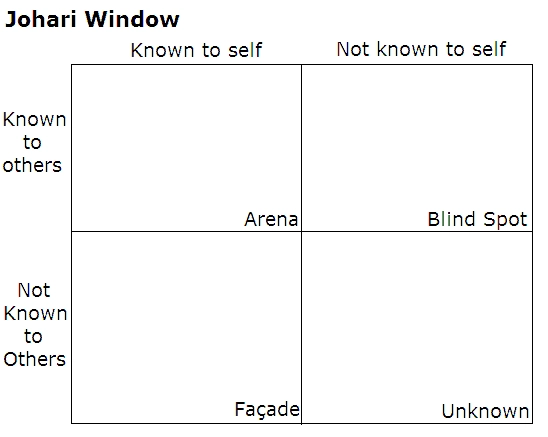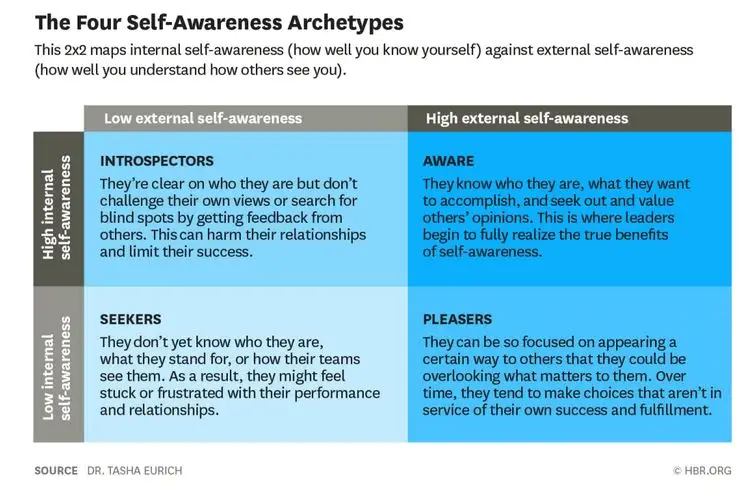Self-Awareness: Top Benefits, Dumb Mistakes, And Key Takeaways
Is self awareness a skill? Yes, The skill of self-awareness is like driving a car. Everybody thinks they’re great at it.
But self-awareness is a double-edged sword. It can give you the insights you need to excel in life, and it can also make you miserable.
According to Tasha Eurich, the author of the book Insight, most people believe they are self-aware, but only 10–15% of the people actually fit the criteria.
After all, there is no self-awareness doctor to tell you how self-aware you are.
First, let’s clarify what self-awareness is.
What Is Self-Awareness?
Self-awareness is the ability to understand yourself and the effect you have on others. With increased self-awareness, you can identify your strengths & weaknesses and evaluate your thoughts and emotions better.
As simple as it may sound to become self-aware, it’s a much more complex and hard skill to master. So now I have good news and bad news for you.
Good news: Self-awareness is a developable skill. And by the end of this post, you’ll know how to build self-awareness.
Bad news: There are wrong and right ways to become self-aware. So I’ll also break down the biggest mistakes people make while practicing self-awareness.
But before I get to it, you may be wondering — “Why do I care about becoming more self-aware?”. Well, here’s the importance of self-awareness.
Why Is Self Awareness Important?
“Knowing others is intelligence; knowing yourself is true wisdom. Mastering others is strength; mastering yourself is true power.”
Lao Tzu
1. Increased self-knowledge
When you know yourself, you’re able to make better decisions according to what matters to you, who you are, and who you want to become. So you end up wasting less of your time on Earth.
2. Accurate self-assessment
You better understand your strengths and weaknesses so you can leverage them to excel in life and your career. You’re also better able to use feedback and life lessons to improve with every mistake you make.
3. Increased self-confidence
Confidence comes from clarity about oneself. When you have no idea who you are and what you stand for, you navigate through life with low self-esteem and self-assurance.
4. More emotional awareness (and happiness)
When you understand your emotional patterns, you’re better able to deal with them. You use your emotions to your advantage as you understand and manage the impact of emotions on you.
5. Better relationships
Self-awareness leads to a better relationship with others and a better relationship with yourself. Relationships are key to life and lack of self-awareness can turn them into a disaster.
So now that you understand the value of self-awareness, let’s get right into how to increase self-awareness and the top self-awareness mistakes to avoid:
3 Biggest Self-Awareness Mistakes
Mistake #1: You think you are self-aware
Yes, I’m talking about you. You — reading (or scrolling through) this article.
Let’s assume you are among 10–15% of the people who are pretty damn self-aware. But is that the end? Certainly not.
Self-awareness is a skill that comes with years of practice and you can never stop becoming more self-aware because it’s an ongoing process.
But if there is no one to tell you if you’re doing it right, then you’ll never know if you’re practicing it the right way.
Introducing the Johari Window model of self-awareness:

Most people keep revolving around the arena and facade. Meanwhile, we ignore blind spots and unknown areas.
When you hide too much of yourself, you become miserable. And it also doesn’t uncover your blind spots.
The solution?
Share yourself with others and keep seeking more feedback.
Here’s what I mean.
Sharing yourself with others leads to self-awareness and discovery as it leads to increasing your arena from the unknown territory. And getting feedback helps you turn your blind spots into your arena.
Takeaway: you need to push your arena so it takes more space. To do it, a) eliminate blind spots by getting feedback b) disclose your hidden self with confidence and c) practice self-awareness the right way.
Speaking of the “right way”…
[mailerlite_form form_id=12]Mistake #2: Using self-reflection as the only way to become more self-aware
Do you think if you keep asking why to yourself, you’ll get the answer you seek?
Here’s the truth: Asking more why will not give you any more new knowledge.
The result: You end up with a wrong answer or you stay in the introspection mode without getting useful insight.
What’s even worse is that introspection may lead you into a downward spiral of self-obsessive thoughts (rumination) or you may become obsessed with repetitive thoughts in search of the “truth”.
Here’s how it works:

There are two types of self-awareness — internal self-awareness is about how we see ourselves and external self-awareness is about how other people see us. You need both to become truly self-aware.
How do you do that?
Stop asking why and start asking what.
For example: Instead of asking “Why do I hate my job?” or “Why isn’t this relationship working?”, ask “What don’t I like about my job?” and “What’s not working in this relationship?”
Why leads to shallow rationalizations that only support or deny what you already believe while what leads you towards specific new information which may help you identify patterns of your behavior, your personality traits, etc.
Takeaway: The combination of a) asking what instead of why b) exploring your thoughts and emotions and c) seeking feedback from the right people (people who you can trust and who want the best for you) can help you uncover the three types of blindness — knowledge blindness, emotional blindness, and behavior blindness.
Mistake #3: Being self-absorbed instead of self-aware
As Tasha Eurich puts it, the rising cult of self is your worst enemy if you want to move from self-absorption to self-awareness.
According to her, 80% of social media users are “Meformers”. That means most of the time, they talk about themselves. “Informers”, on the other hand, tend to post non-self-related posts most of the time.
There’s nothing wrong with posting about yourself, but if all you do is post selfies and talk about yourself, we’ve got some work to do. The solution is to start focusing on others and become an “Informer”.
Another problem with the cult of self is that sometimes, we focus too much on self-love that we discard the importance of self-improvement. We’re moving from the age of effort (based on the principles of hard work, grit, and resilience) to the age of esteem (where the goal is to simply feel good about oneself).
People may tell you that you’re special to make you feel good, but you’re not. What you need to hear is that you’re not special, but you can become great if you choose to.
It’s not to say that you should go down the route of self-loathing. Instead, accept yourself and then improve yourself because self-acceptance and self-improvement can go hand in hand.
Takeaway: To escape the cult of self, focus on others, and become an “Informer”. Also, monitor your internal monologue (self-talk) to stay away from self-sabotage. Then, love and improve yourself at the same time.
Developing And Increasing Your Self-Awareness
If your emotional abilities aren’t in hand, if you don’t have self-awareness, if you are not able to manage your distressing emotions, if you can’t have empathy and have effective relationships, then no matter how smart you are, you are not going to get very far. – Daniel Goleman
Self-awareness is a never-ending skill to master. It takes practice to become good at it. But now that you know the biggest mistakes people make when trying to be more self-aware, you’ll be far ahead of the game.
You won’t make the same mistakes. Instead, you’ll objectively take a hard look at yourself and use that knowledge to be more confident, happy, and successful in work, life and relationships.
Self-awareness is just one skill to master on the path of becoming more emotionally intelligent. If you’d like to take a deep dive into emotional intelligence, I’ve created an ultimate guide for you to master your emotions so you can live a more peaceful and fulfilled life. Enter your email below to get immediate access to it for free.

